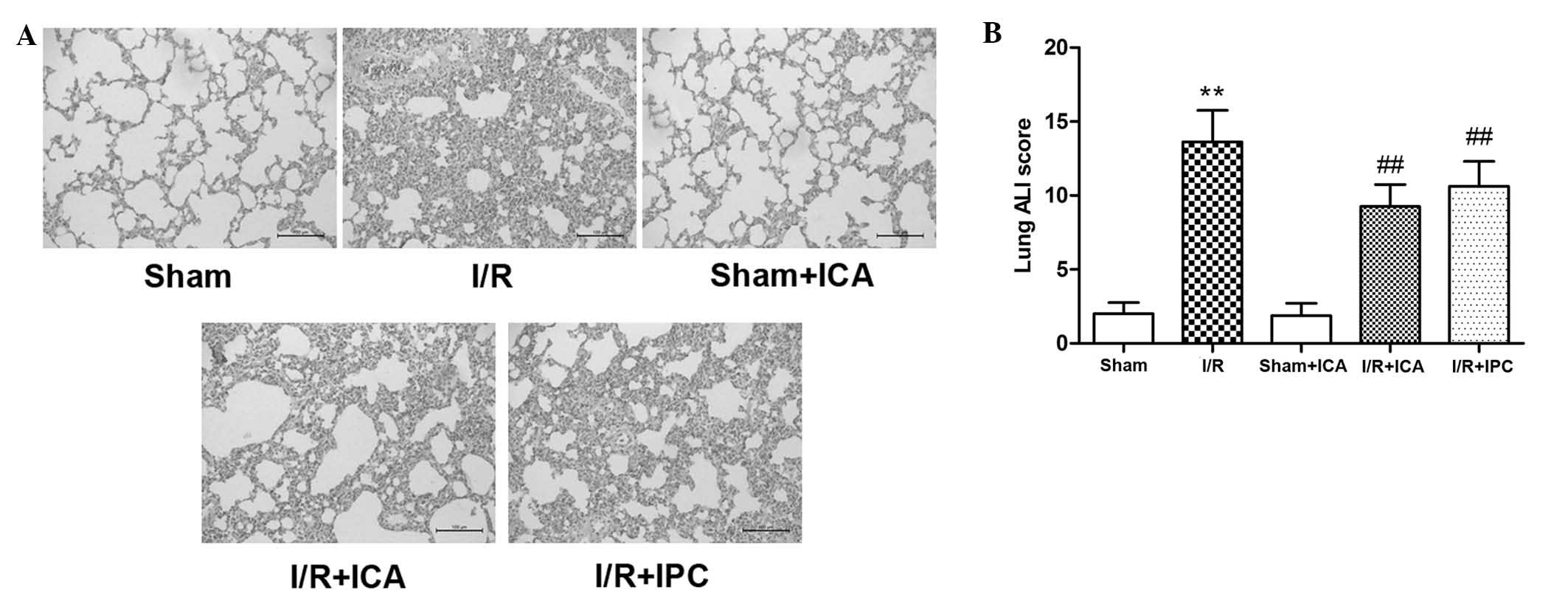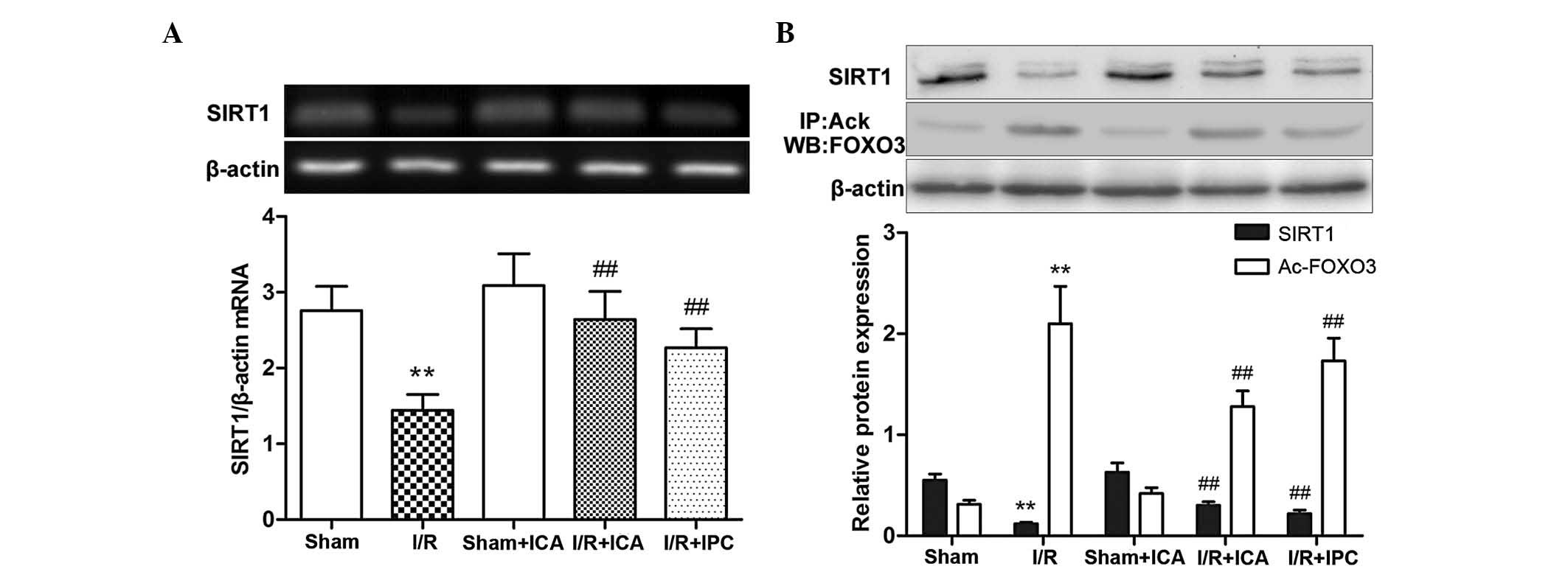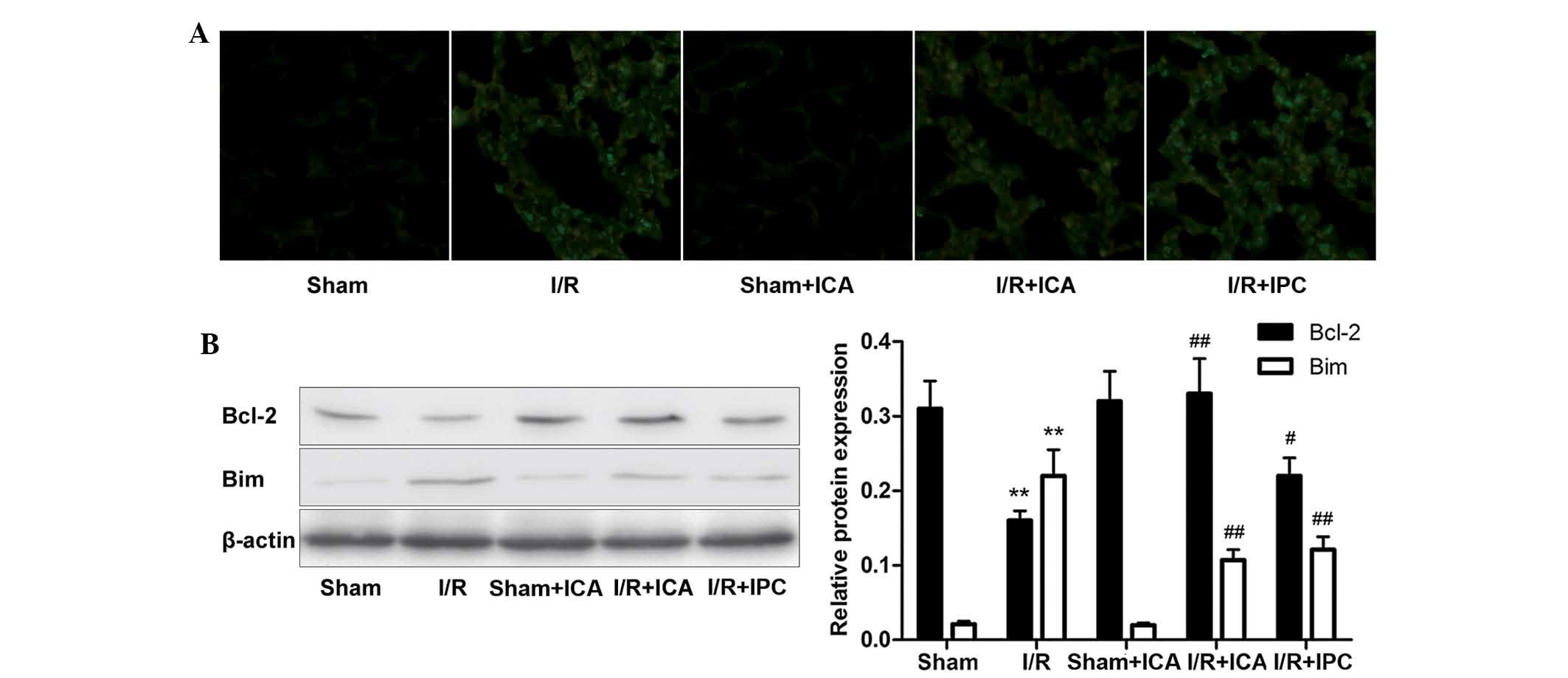|
1
|
Pierro A and Eaton S: Intestinal ischemia
reperfusion injury and multisystem organ failure. Semin Pediatr
Surg. 13:11–17. 2004. View Article : Google Scholar : PubMed/NCBI
|
|
2
|
Higuchi S, Wu R, Zhou M, et al: Gut
hyperpermeability after ischemia and reperfusion: attenuation with
adrenomedullin and its binding protein treatment. Int J Clin Exp
Pathol. 1:409–418. 2008.PubMed/NCBI
|
|
3
|
Tendler DA: Acute intestinal ischemia and
infarction. Semin Gastrointest Dis. 14:66–76. 2003.PubMed/NCBI
|
|
4
|
Li C and Jackson RM: Reactive species
mechanisms of cellular hypoxia-reoxygenation injury. Am J Physiol
Cell Physiol. 282:C227–C241. 2002. View Article : Google Scholar : PubMed/NCBI
|
|
5
|
Eltzschig HK and Eckle T: Ischemia and
reperfusion - from mechanism to translation. Nat Med. 17:1391–1401.
2011. View
Article : Google Scholar : PubMed/NCBI
|
|
6
|
Cui T, Miksa M, Wu R, et al: Milk fat
globule epidermal growth factor 8 attenuates acute lung injury in
mice after intestinal ischemia and reperfusion. Am J Respir Crit
Care Med. 181:238–246. 2010. View Article : Google Scholar : PubMed/NCBI
|
|
7
|
Wu R, Dong W, Ji Y, et al: Orexigenic
hormone ghrelin attenuates local and remote organ injury after
intestinal ischemia-reperfusion. PLOS One. 3:e20262008. View Article : Google Scholar : PubMed/NCBI
|
|
8
|
Sorkine P, Szold O, Halpern P, et al: Gut
decontamination reduces bowel ischemia-induced lung injury in rats.
Chest. 112:491–495. 1997. View Article : Google Scholar : PubMed/NCBI
|
|
9
|
Mura M, Andrade CF, Han B, et al:
Intestinal ischemia-reperfusion induced acute lung injury and
oncotic cell death in multiple organs. Shock. 28:227–238. 2007.
View Article : Google Scholar : PubMed/NCBI
|
|
10
|
Fu TL, Zhang WT, Zhang L, et al:
L-arginine administration ameliorates serum and pulmonary cytokine
response after gut ischemia-reperfusion in immature rats. World J
Gastroenterol. 11:1070–1072. 2005. View Article : Google Scholar : PubMed/NCBI
|
|
11
|
Moraes LB, Murakami AH, Fontes B, et al:
Gut ischemia/reperfusion induced acute lung injury is an alveolar
macrophage dependent event. J Trauma. 64:1196–1200. 2008.
View Article : Google Scholar : PubMed/NCBI
|
|
12
|
Ben DF, Yu XY, Ji GY, et al: TLR4 mediates
lung injury and inflammation in intestinal ischemia-reperfusion. J
Surg Res. 174:326–333. 2012. View Article : Google Scholar : PubMed/NCBI
|
|
13
|
Biswas SK and Rahman I: Environmental
toxicity, redox signaling and lung inflammation: the role of
glutathione. Mol Aspects Med. 30:60–76. 2009. View Article : Google Scholar : PubMed/NCBI
|
|
14
|
Marfe G, Tafani M, Pucci B, et al: The
effect of marathon on mRNA expression of anti-apoptotic and
pro-apoptotic proteins and sirtuins family in male recreational
long-distance runners. BMC Physiol. 10:72010. View Article : Google Scholar
|
|
15
|
Lai L, Yan L, Gao S, et al: Type 5
adenylyl cyclase increases oxidative stress by transcriptional
regulation of MnSOD via the sirt1/foxo3a pathway. Circulation.
127:1692–1701. 2013. View Article : Google Scholar : PubMed/NCBI
|
|
16
|
Alcendor RR, Kirshenbaum LA, Imai S, et
al: Silent information regulator 2alpha, a longevity factor and
class III histone deacetylase, is an essential endogenous apoptosis
inhibitor in cardiac myocytes. Circ Res. 95:971–980. 2004.
View Article : Google Scholar
|
|
17
|
Kelly G: A review of the sirtuin system,
its clinical implications, and the potential role of dietary
activators like resveratrol: part 1. Altern Med Rev. 15:245–263.
2010.
|
|
18
|
Sauve AA, Wolberger C, Schramm VL and
Boeke JD: The biochemistry of sirtuins. Ann Rev Biochem.
75:435–465. 2006. View Article : Google Scholar : PubMed/NCBI
|
|
19
|
Haiqis MC and Guarente LP: Mammalian
sirtuins - emerging roles in physiology, aging, and calorie
restriction. Gen Dev. 20:2913–2921. 2006. View Article : Google Scholar : PubMed/NCBI
|
|
20
|
Hsu CP, Zhai P, Yamamoto T, et al: Silent
information regulator 1 protects the heart from
ischemia/reperfusion. Circulation. 122:2170–2182. 2010. View Article : Google Scholar : PubMed/NCBI
|
|
21
|
Brunet A, Sweeney LB, Sturgill JF, et al:
Stress-dependent regulation of FOXO transcription factors by the
SIRT1 deacetylase. Science. 303:2011–2015. 2004. View Article : Google Scholar : PubMed/NCBI
|
|
22
|
Langley E, Pearson M, Faretta M, et al:
Human SIR2 deacetylates p53 and antagonizes PML/p53-induced
cellular senescence. EMBO J. 21:2383–2396. 2002. View Article : Google Scholar : PubMed/NCBI
|
|
23
|
Yeung F, Hoberg JE, Ramsey CS, et al:
Modulation of NF-kappaB-dependent transcription and cell survival
by the SIRT1 deacetylase. EMBO J. 23:2369–2380. 2004. View Article : Google Scholar : PubMed/NCBI
|
|
24
|
Motta MC, Divecha N, Lemieux M, et al:
Mammalian SIRT1 represses forkhead transcription factors. Cell.
116:551–563. 2004. View Article : Google Scholar : PubMed/NCBI
|
|
25
|
Picone P, Giacomazza D, Vetri V, et al:
Insulin-activated Akt rescues Aβ oxidative stress-induced cell
death by orchestrating molecular trafficking. Aging Cell.
10:832–843. 2011.PubMed/NCBI
|
|
26
|
Wang L, Zhang L, Chen ZB, et al: Icariin
enhances neuronal survival after oxygen and glucose deprivation by
increasing SIRT1. Eur J Pharmacol. 609:40–44. 2009. View Article : Google Scholar : PubMed/NCBI
|
|
27
|
Zhang L, Huang S, Chen Y, et al: Icariin
inhibits hydrogen peroxide-mediated cytotoxicity by up-regulating
sirtuin type 1-dependent catalase and peroxiredoxin. Basic Clin
Pharmacol Toxicol. 107:899–905. 2010.PubMed/NCBI
|
|
28
|
Zhu HR, Wang ZY, Zhu XL, et al: Icariin
protects against brain injury by enhancing SIRT1-dependent
PGC-1alpha expression in experimental stroke. Neuropharmacology.
59:70–76. 2010. View Article : Google Scholar : PubMed/NCBI
|
|
29
|
Wang GZ, Yao JH, Jing HR, et al:
Suppression of the p66shc adapter protein by protocatechuic acid
prevents the development of lung injury induced by intestinal
ischemia reperfusion in mice. J Trauma Acute Care Surg.
73:1130–1137. 2012. View Article : Google Scholar : PubMed/NCBI
|
|
30
|
Mikawa K, Nishina K, Takao Y and Obara H:
ONO-1714, a nitric oxide synthase inhibitor, attenuates
endotoxin-induced acute lung injury in rabbits. Anesth Analg.
97:1751–1755. 2003. View Article : Google Scholar : PubMed/NCBI
|
|
31
|
Dijkers PF, Medema RH, Lammers JW, et al:
Expression of the pro-apoptotic Bcl-2 family member Bim is
regulated by the forkhead transcription factor FKHR-L1. Current
Biology. 10:1201–1204. 2000. View Article : Google Scholar : PubMed/NCBI
|
|
32
|
Hassoun HT, Kone BC, Mercer DW, et al:
Post-injury multiple organ failure: the role of the gut. Shock.
15:1–10. 2001. View Article : Google Scholar : PubMed/NCBI
|
|
33
|
Kostopanagiotou G, Avgerinos E,
Costopanaqiotou C, et al: Acute lung injury in a rat model of
intestinal ischemia-reperfusion: the potential time depended role
of phospholipases A (2). J Surg Res. 147:108–116. 2008. View Article : Google Scholar : PubMed/NCBI
|
|
34
|
Yeh KY, Yeh M, Glass J, et al: Rapid
activation of NF-kappaB and AP-1 and target gene expression in
postischemic rat intestine. Gastroenterology. 118:525–534. 2000.
View Article : Google Scholar : PubMed/NCBI
|
|
35
|
Koo HC, Davis JM, Li Y, et al: Effects of
transgene expression of superoxide dismutase and glutathione
peroxidase on pulmonary epithelial cell growth in hyperoxia. Am J
Physiol Lung Cell Mol Physiol. 288:L718–L726. 2005.PubMed/NCBI
|
|
36
|
Blander G and Guarente L: The sir2 family
of protein deacetylases. Annu Rev Biochem. 73:417–435. 2004.
View Article : Google Scholar : PubMed/NCBI
|
|
37
|
North BJ and Verdin E: Sirtuins:
Sir2-related NAD-dependent protein deacetylases. Genome Biol.
5:2242004. View Article : Google Scholar : PubMed/NCBI
|
|
38
|
Okawa H, Motohashi H, Kobayashi A, et al:
Hepatocyte-specific deletion of the keapl gene activates Nrf2 and
confers potent resistance against acute drug toxicity. Biochem
Biophys Res Commun. 339:79–88. 2006. View Article : Google Scholar : PubMed/NCBI
|
|
39
|
Reisman SA, Csanaky IL, Aleksunes LM and
Klaassen CD: Altered disposition of acetaminophen in Nrf2-null and
Keapl-knockdown mice. Toxicol Sci. 109:31–40. 2009. View Article : Google Scholar : PubMed/NCBI
|
|
40
|
Zhai X, Lin M, Zhang F, et al: Dietary
flavonoid genistein induces Nrf2 and phase II detoxification gene
expression via ERKs and PKC pathways and protects against oxidative
stress in Caco-2 cells. Mol Nutr Food Res. 57:249–259. 2013.
View Article : Google Scholar : PubMed/NCBI
|
|
41
|
Calvert JW, Jha S, Gundewar S, et al:
Hydrogen sulfide mediates cardioprotection through Nrf2 signaling.
Circ Res. 105:365–374. 2009. View Article : Google Scholar : PubMed/NCBI
|
|
42
|
Li Y, Yao JH, Hu XW, et al: Inhibition of
Rho kinase by fasudil hydrochloride attenuates lung injury induced
by intestinal ischemia and reperfusion. Life Sci. 88:104–109. 2011.
View Article : Google Scholar : PubMed/NCBI
|
|
43
|
Tanaka J, Qiang L, Banks AS, et al: Foxo1
links hyperglycemia to LDL oxidation and endothelial nitric oxide
synthase dysfunction in vascular endothelial cells. Diabetes.
58:2344–2354. 2009. View Article : Google Scholar : PubMed/NCBI
|


















